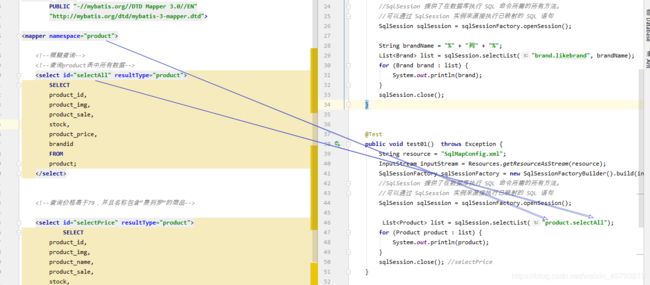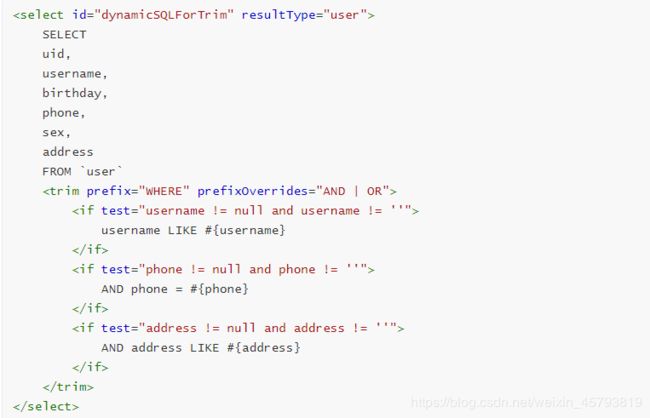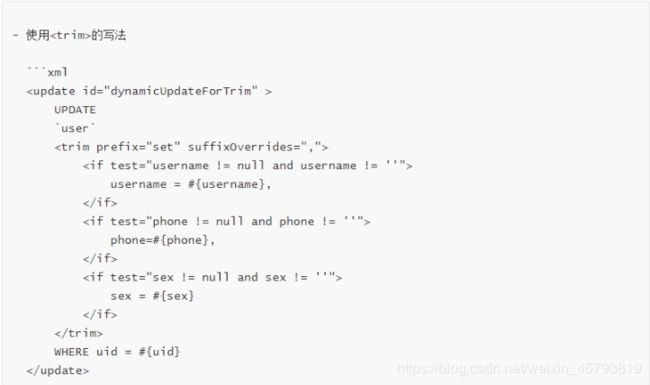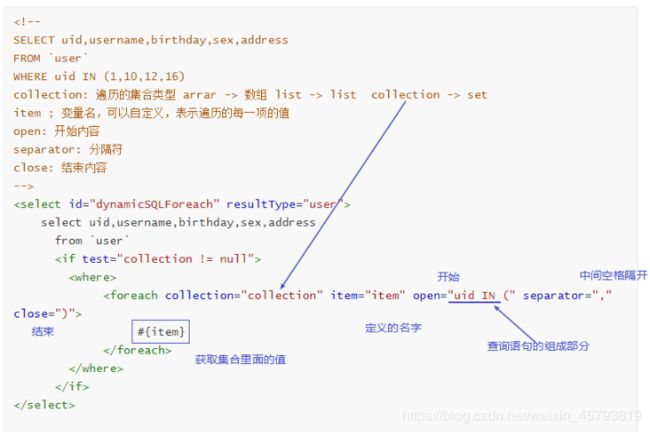java_mybatis总结2
pom.xml
<!-- mybatis核心依赖 -->
<dependency>
<groupId>org.mybatis</groupId>
<artifactId>mybatis</artifactId>
<version>3.5.5</version>
</dependency>
<!-- mysql连接依赖 -->
<dependency>
<groupId>mysql</groupId>
<artifactId>mysql-connector-java</artifactId>
<version>8.0.20</version>
</dependency>
<!-- junit测试 -->
<dependency>
<groupId>junit</groupId>
<artifactId>junit</artifactId>
<version>4.13</version>
<scope>test</scope>
</dependency>
<!-- log4j日志依赖 -->
<dependency>
<groupId>log4j</groupId>
<artifactId>log4j</artifactId>
<version>1.2.17</version>
</dependency>
jdbc.properties
注意mybatis版本>=6.0使用如下驱动,如果<6.0使用com.mysql.jdbc.Driver
driver=com.mysql.cj.jdbc.Driver
url=jdbc:mysql://localhost:3306/mybatis?useUnicode=true&characterEncoding=UTF-8&&serverTimezone=Hongkong&useSSL=false
username=root
password=root
mybatis-config.xml
<?xml version="1.0" encoding="UTF-8" ?>
<!DOCTYPE configuration
PUBLIC "-//mybatis.org//DTD Config 3.0//EN"
"http://mybatis.org/dtd/mybatis-3-config.dtd">
<configuration>
<!--引入jdbc属性配置-->
<properties resource="jdbc.properties"></properties>
<!--mybatis的核心环境配置-->
<environments default="development">
<environment id="development">
<!--
在 MyBatis 中有两种类型的事务管理器(也就是 type="[JDBC|MANAGED]"):
JDBC – 这个配置直接使用了 JDBC 的提交和回滚设施
MANAGED – 这个配置几乎没做什么
-->
<transactionManager type="JDBC"/>
<!--type可选值:UNPOOLED 不使用连接池
POOLED使用连接池
JNDI 从配置好的JNDI数据源获取连接池-->
<dataSource type="POOLED">
<property name="driver" value="${driver}"/>
<property name="url" value="${url}"/>
<property name="username" value="${username}"/>
<property name="password" value="${password}"/>
</dataSource>
</environment>
</environments>
<mappers>
<mapper resource="mapper/UserMapper.xml"/>
</mappers>
</configuration>
UserMapper.xml
<?xml version="1.0" encoding="UTF-8" ?>
<!DOCTYPE mapper
PUBLIC "-//mybatis.org//DTD Mapper 3.0//EN"
"http://mybatis.org/dtd/mybatis-3-mapper.dtd">
<!--
namespace
用于对SQL语句进行隔离,mapper文件有多个,不同的mapper文件中SQL可能重复,
可以使用namespace进行区分,因此namespace最好保证唯一性,否则没有意义
-->
<mapper namespace="test">
<!--
id:sql片段的唯一标识,同一个mapper文件中不能重复
parameterType:参数类型
resultType:返回值类型
-->
<select id="selectOne" parameterType="int" resultType="com.czxy.mybatis.model.User">
SELECT
uid,
username,
birthday,
phone,
sex,
address
FROM `user`
WHERE uid = #{aa}
</select>
</mapper>
这写配置文件都在resource目录下存放
测试
public class MyBatisTest {
@Test
public void selectOne() throws IOException {
String resource = "mybatis-config.xml";
InputStream inputStream = Resources.getResourceAsStream(resource);
SqlSessionFactory sqlSessionFactory = new SqlSessionFactoryBuilder().build(inputStream);
//SqlSession 提供了在数据库执行 SQL 命令所需的所有方法。
//可以通过 SqlSession 实例来直接执行已映射的 SQL 语句
SqlSession sqlSession = sqlSessionFactory.openSession();
//通过 namespace.id的方式确定要执行的SQL片段
User user = sqlSession.selectOne("test.selectOne",10);
System.out.println(user);
//用完后必须管理连接
sqlSession.close();
}
}
添加 一条数据可以查看生成主键
<insert id="insertUserAndReturnID" useGeneratedKeys="true" keyProperty="uid">
INSERT INTO `user`
(uid,username,birthday,phone,sex,address)
VALUES(NULL,#{username},#{birthday},#{phone},#{sex},#{address})
</insert>
普通xml和有接口的xml的区别
普通xml的没有接口的mapper namespace 是起一个名字,有接口的mapper的namespace是写写的是接口的相对路径,普通的用于单表,高级的用于多表,高级接口里面方法的名字就是xml的id ,直接调用这个接口里的方法,普通的namespace的名字 加上,需要调用sql自带方法,绑定上。
片段id就是该方法
例子

传参数类型
一个 参数时,在#{}里面的名字可以和传过来的不一样
多个 参数可以用map ,pojo 但是必须要和#{}里面名字一样
返回的类型 对象 集合 map 个数
resultMap
当查询结果有多个列,并且列名和字段名称不一致时,mybatis无法将结果封装到model对象中,这是需要通过resultMap绑定列和属性关系
动态sql
if 需要加上where 对传入参数的属性值进行判断,结果为true则拼接SQL片段,否则不拼接,容易报错,少用这种
例子
<!--动态SQL - if -->
<select id="selectByNameAndBirthday2" resultType="user">
select <include refid="baseColumn"></include>
from `user`
where
<if test="username != null and username != ''">
username like #{username}
</if>
<if test="birthday != null">
AND birthday = #{birthday}
</if>
</select>
推荐
where 符合条件的判断上 ,不符合条件的进行下一个判断,都不符合查询所有
例子
<!--动态SQL - if where -->
<select id="selectByNameAndBirthday2" resultType="user">
select <include refid="baseColumn"></include>
from `user`
<where>
<if test="username != null and username != ''">
username like #{username}
</if>
<if test="birthday != null">
AND birthday = #{birthday}
</if>
</where>
</select>
choose 适用于 查询的字段于表的字段不一样 ,但有一定规则能联系上
注意
当比较的值只有一个字符时,mybatis会把值当成char处理,转成数值,汉字是无法直接转成数值的,因此这里要用双引号,表示是字符串
例子
<select id="dynamicSQLChoose" resultType="user">
select
<include refid="baseColumn"></include>
from `user`
<where>
<choose>
<when test='sex != null and sex == "男"'>
and sex = '1'
</when>
<when test='sex != null and sex == "女"'>
and sex = '2'
</when>
<otherwise>
and sex is not null
</otherwise>
</choose>
</where>
</select>
foreach
类似于java中for循环,主要用于in语句的条件查询
set
set用于update的动态SQL中。符合条件的就判断,不符合条件的过滤,不会报错
例子
<!--动态sql - update只用if判断的写法-->
<update id="dynamicUpdateUser" >
UPDATE
`user`
<set>
<if test="username != null and username != ''">
username = #{username},
</if>
<if test="phone != null and phone != ''">
phone=#{phone},
</if>
<if test="sex != null and sex != ''">
sex = #{sex}
</if>
</set>
WHERE uid = #{uid}
</update>
trim(了解)
不符合条件就会留下and 或 or 除去多余的and ,就是条件没有满足时,不报错
例子

不符合条件的,会留下逗号 ,可以用trim取出逗号

适用trim的话可以除去没有符合条件的关键字,或者逗号,关键字包裹在
prefix="" ,去除的逗号包裹在 prefixOverrides=“AND | OR” ,有逗号,关键字等,我只会用前缀
分页
导入依赖
<!-- https://mvnrepository.com/artifact/com.github.pagehelper/pagehelper -->
<dependency>
<groupId>com.github.pagehelper</groupId>
<artifactId>pagehelper</artifactId>
<version>5.1.10</version>
</dependency>
mybatis-config.xml
<plugins>
<!-- com.github.pagehelper为PageHelper类所在包名 -->
<plugin interceptor="com.github.pagehelper.PageInterceptor">
<!-- 选择mysql数据库的分页方式 -->
<property name="helperDialect" value="mysql"/>
<property name="rowBoundsWithCount" value="true"/>
</plugin>
</plugins>
相当于一个查询所有
@Test
public void limitTest(){
SqlSession session = MyBatisMapperUtils.getSession();
UserMapper mapper = session.getMapper(UserMapper.class);
//1. 开启分页 : pageNum 第几页,从1开始, pageSize 每页显示条数
PageHelper.startPage(1,3);
//2. 条件查询
List<User> users = mapper.selectAll();
//3. 将查询结果交给PageInfo处理
PageInfo<User> pageInfo = new PageInfo<>(users);
//分页相关结果
long total = pageInfo.getTotal(); //总条数
int pageNum = pageInfo.getPageNum(); //当前页
int pages = pageInfo.getPages(); //总页数
List<User> pageInfoList = pageInfo.getList(); //当前页数据
System.out.println("总条数:"+total+" 当前页:"+pageNum+" 总页数"+pages);
System.out.println("当前页数据....");
for (User user : pageInfoList) {
System.out.println(user);
}
MyBatisMapperUtils.closeSession();
}
总结
日期 只能用 null 不能用 ’ ’
价格 一般建议用BigDecimal

